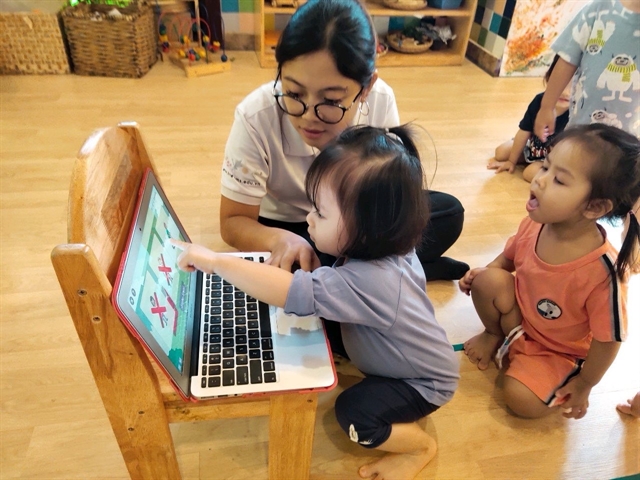 Society
Society


|
| Children during playtime at a kindergarten in HCM City. Experts have called for consent from both the child and their legal guardian before processing children’s personal data. — VNS Photo Bồ Xuân Hiệp |
HCM CITY — The processing of children’s personal data must obtain consent from both the child and their legal guardian, except where otherwise regulated by law, experts said at a seminar in HCM City on Tuesday.
The event, titled Ensuring Personal Data Safety for Children: Current Situation and Solutions, was jointly organised by the HCM City Association for the Protection of Children’s Rights and the Taiwan Fund for Children and Families (TFCF).
Speakers warned of rising threats to children's privacy in the digital age, especially with the growing use of AI, smart devices, and online education platforms.
Đặng Hoa Nam, vice president of the Việt Nam Association for the Protection of Children’s Rights, said the 2013 Constitution guarantees the inviolability of privacy, personal secrets, and family secrets.
“This means no one may collect, process, or share others’ personal data without legal grounds.”
For children aged seven and above, processing personal data must involve the informed consent of both the child and their guardian, he said.
If there is a conflict between the child’s and the guardian’s views, the process must strike a balance with the child's best interests taking precedence.
Nguyễn Lữ Gia, manager of the Child Protection Programme at Save the Children International, said: “Consent is just the beginning, data protection must be integrated into organisational systems.”
“We need designated data protection officers (DPOs), risk assessments, and strict protocols, especially when building new platforms or digital tools.”
Gia also stressed the need for ongoing training for all staff. “After recruitment, every staff member must complete data protection training, and regular retraining must follow. Once their contract ends, their access to the system must be immediately revoked.”
Mai Thị Ngọc Mai, chairwoman of the HCM City Association for the Protection of Children’s Rights, warned that personal data is not merely technical information, but it also is deeply connected to a child’s safety and development.
“Children’s data relates to their dignity, their protection from harm, and their future. We must see it not only as a legal matter but as a moral responsibility,” she said.
“We need synchronised efforts from government agencies, civil society, families, and especially from the children themselves. Community awareness, legal reform, and interdisciplinary cooperation are more critical than ever.”
Huang Ya-Ke, chief representative of TFCF in Việt Nam, shared international lessons in safeguarding children's data, including the use of “informed consent forms” to ensure both children and their guardians understand how data is collected and used.
“Children’s personal data must be handled with the highest ethical and legal standards to protect their dignity and future,” Huang noted.
The HCM City Association for the Protection of Children’s Rights is a leading non-governmental organisation dedicated to children’s safety, legal protection, and wellbeing.
Meanwhile, the Taiwan Fund for Children and Families (TFCF), based in Taichung, supports disadvantaged children and families in Taiwan (China) and globally, including a strong presence in Việt Nam since 2015. — VNS




